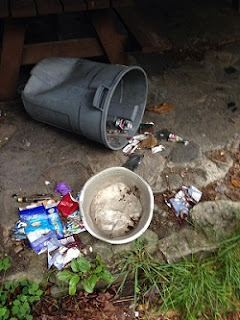Help Keep Vermont’s Bears Wild
Report Bear Incidents to Vt Fish
& Wildlife Department Website
MONTPELIER, VT – Conflicts between people and Vermont’s healthy bear population are becoming more common and Vermont State Game Wardens and biologists have been busy fielding calls from the public. Reports of bears frequenting human areas have been on the rise this summer, especially in the towns of Middlebury, East Montpelier, Lyndonville, Waterbury, Duxbury, Bolton, Killington, Richmond, and Addison.
According
to Vermont Fish and Wildlife bear biologist Forrest Hammond, black bears are
naturally skittish, but lose their fear of people as they begin to associate
human areas with food rewards. Allowing bears to feed off backyard birdseed,
garbage, livestock, and beehives causes them to get overly comfortable around
humans, which often leads to negative consequences for the bear.
“Once a
bear is conditioned to associate people with food, little can be done to fix
the problem because relocating bears is rarely effective. Sadly,
food-conditioned bears may need to be put down to protect human safety,” said
Hammond. “The best thing we can do is to change our behavior and ensure
that bears don’t have easy access to human foods so they don’t become a problem
in the first place.”
Bears are
attracted to neighborhoods where they can find easy food in the form of bird
seed and garbage, but they have no interest in interacting with people.
The most important thing to do when seeing a bear is to scare it with loud
noise from a safe distance so that it associates back yards with negative
experiences and remains in the wild. If a bear doesn’t flee from the noise, it
has likely already been rewarded with food. It is critical to make sure these
bears have no reason to return by removing all food attractants.
Here are a
few tips to help keep bears wild:
· Keep trash inside until the morning of garbage pickup. Alternatively, you can replace your garbage or dumpster with a bear-proof receptacle.· Remove all pet food and birdfeeders, and cleanup surrounding seeds – this is a common way for bears to get hooked on human food.
· Keep grills and outdoor cooking areas clean
· Use electric fencing to protect your beehives, chickens, gardens, and livestock.
· Compost by adding three parts carbon-rich ‘brown’ materials like dry leaves, straw, or ripped up paper for every one part food scraps or ‘green’ materials. Bury fresh food scraps deep in the pile to reduce their smell, and avoid composting meat, dairy, or overly smelly foods.
· Respect a bear’s size and strength and enjoy them from a distance. When you see one near your home, scare off the bear by making noise rather than taking a picture.
People can
report bear conflicts to at: anrweb.vt.gov/FWD/FW/WildlifeBearReport.aspx
The Vermont Fish & Wildlife Department uses this information to
identify hotspots of human-bear conflicts, to monitor the severity of
conflicts, and to give advice to residents on avoiding further conflict with
bears.
Although
it is extremely rare for a black bear to attack a human, bears are wild animals
and should never be approached. When there is a bear physically present, it is
best to bring children and pets inside. However, reports of bear sightings in
the area should not deter people from enjoying time outdoors or from allowing
children to play outside.
Although
the large number of reports may make us believe that Vermont is being overrun
with problem bears a relatively small number of bears are responsible for most
of the reports. A single bear can travel more than five miles in a night
and along the way visit dozens of backyards in a relatively short period of
time. A bear that is being fed may not pose a problem for the people
feeding it, but it can cause property damage or problems to other neighbor’s
homes.
“We are
lucky to live in a place like Vermont where we have healthy populations of
bears and other wildlife that are so enjoyable to see in the wild,” said
Hammond. “By working together to minimize human-bear conflicts, we can
ensure Vermont’s bears remain healthy and wild.”
Remember:
A fed bear is a dead bear.
For
Immediate Release: June 11, 2018
Media
Contacts: Forrest Hammond 802-777-7493; Scott Darling 802-777-1732; Mark Scott
802-777-4217


